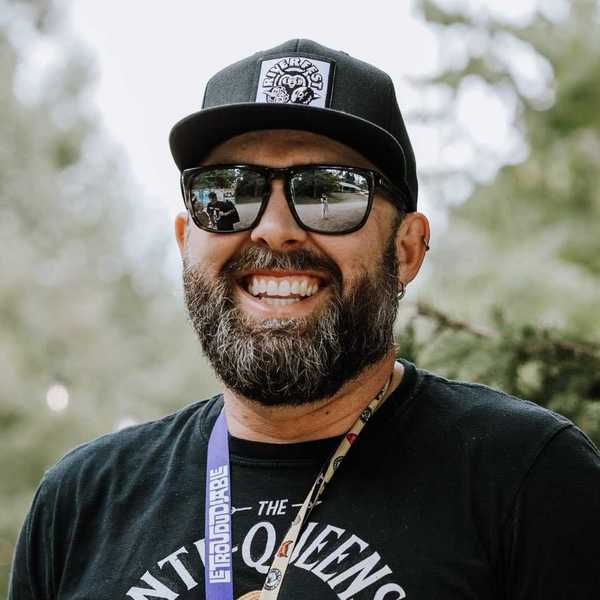Today, Jim Jj Johnston Salutes David Farrell
Welcome to JJ-365 Salutes. Over 2018, we pay tribute daily to one of “The Good Ones”. Today we are shining the light on David Farrell.

By Jim Jj Johnston
Welcome to JJ-365 Salutes. Over 2018, we pay tribute daily to one of “The Good Ones”. Today we are shining the light on David Farrell.
One of my favourite things to do, if you haven’t figured this out because of how many times I have mentioned it, is going to industry functions and conferences. Prior to Canadian Music Week, The Canadian Music and Industry gathering was called ‘The Record Conference’, run by David and his team each year. As young rats we had such a good time networking, eating, drinking and celebrating our industry. And then there were the awards that we all wanted to win and waited with bated breath when they were being announced. I would always find David and have a conversation with him about music, charts, people etc. I was a little guy, he was a famous personality, but he always took the time as a British gent to suffer this fool gladly. In time we got to know each other better, and a bunch of us in the industry would hang including weekends away. The weekend all of us vagabonds converged on David’s cottage will go down as one of the most fun!
Born in Ladysmith, BC, his British parents returned to the UK when he was three, and he would live there until shortly after Britpop rocked the world. Both of his parents loved music, but it was the music of their era, and his was to be found on TV shows such as ‘Top of the Pops’ and ‘Ready Steady Go!’, and two offshore pirate radio stations (one of which he says ‘went out of its way to infuriate an already rattled Whitehall establishment with midnight readings from the then-banned D.H. Lawrence novel, Lady Chatterley’s Lover’).
His last few years in the UK were spent in Leigh on Sea, a small fishing village at the mouth of the Thames Estuary that was both a landing place for the Romans, in their conquest of Britain, and a strategic defense point against U-boat penetrations in WW 11. Vestiges of both these history-making eras remained, and he recalls (steam) train rides to London that would pass through an outer section of the city blighted by charred skeletal homes from German bombing raids nearly two decades before.
The closest ‘local’ was The Elms Hotel where The Paramounts were the hometown house band Saturdays. They would later change the name and become famous as Procol Harum. A school chum’s father worked for Parlophone Records, and he would share some of the 45’s his father brought home as ‘samples’. The first record in David’s collection would be “Steel Guitar and A Glass of Wine” by Paul Anka. He describes those as glorious years for him.
David’s Dad worked on the ‘foreign desk’ of The Observer. One of his east-European correspondents was the notorious Kim Philby who filed his last dispatch (and letter of resignation) on deadline, before bunking it to the Soviet Union. The newspaper was owned by the Astors and several times they were invited to Viscount Astor’s baronial Cliveden House estate in Berkershire, the setting for what was to become known as ‘The Profumo Affair’ that ensnared many of Britain’s elite with Mandy Rice-Davies and Christine Keeler. Life, for David, was colourful in those early years.
The family returned to Canada with his dad taking a post as a senior editor at the Globe and Mail. It was there that he met a number of prominent and talented writers and editors, one of whom was the famous Ritchie Yorke who set his internal compass and pointed him in a direction that would become his career path as a journalist.
At first, it was writing for the alternative press, then The Telegram, Broadcast News, and, later, a chance meeting led to him being hired by Joey Cee who was launching Canada’s latest music trade, Record Week. The job was as desk editor, in charge of writing, and editing copy submitted by some of the lions of the business such as Jeani Reid, Juan Rodriguez, Martin Melhuish, and Larry Leblanc. David says he was suitably under-qualified and flew by the seat of his pants, but the position gave him a door to enter a new kingdom and access to many talented, influential and fascinating individuals in the business, and on the stage.
He says he can’t count the number of interviews he has done over the years and many stand out like: “ I thought that John Lennon and Kate Bush were first-rate twits. As a songwriter and melodist, Lennon was unique and gifted, but his life was a shamble outside the group and, to me, his philosophical
meanderings, well-intentioned or not, were sheer poppycock. He could have done so much more had he ‘kept it together’. Bush just seemed to be a spoiled brat who got lucky with Dave Gilmour producing that great first album. Her operatic voice to me shrieks of indulgence, and in an interview situation, she came across as shallow and self-absorbed.
Joe Strummer, on the other hand, was yobbish, uneducated, and very much a product of Thatcherism’s brutal remedy to bring Britain back from the brink of insolvency–but his born intelligence and unyielding determination convinced me that he was a true leader and a gifted speaker for a generation cast into the coal bin of Britain’s electric future. He proved himself to be an undeniably influential and talented working-class hero.”
Another enormous talent he had the good fortune to interview was Peter Gabriel, shortly before the release of his first album. David expounds: “In person, he was karmic, almost otherworldly, a man gifted with cerebral intelligence, exceptional empathy, a vision of life that was as irregular as a square penny and an inner calmness that was as perceptible as his hairless head. I have found his creative output often difficult, even uncomfortable to listen to–but as to his having uncommon talents, I have not a shred of doubt.”
David’s path has led him many places and put him in front of many more people. He has been sued, threatened, and once even given an award. “I have always viewed myself an outsider, my problem, I guess, but my job is not to insert myself into situations but to recount them for others to interpret. I loath repletion, so I have never been a fan of commercial radio, and haven’t found a spot on the dial I’m comfortable listening to since the eclectic, free-form CHUM-FM was tethered. But I have come to respect and hold dear a great many people in that industry, and some of the dearest are now dead. Among these CHUM news director Larry Wilson, Peter Griffin during his freeform days at CHUM-FM, and Dave Patrick at CJAD and CKGM.”
David's writing about Canada’s music scene for US trades, including Billboard magazine opened even more doors for him and put him in front of Quincy Jones one breezy afternoon in Palm Springs. He describes Quincy’s stories as being "as legendary as the man himself is and I found him open, unaffected and pleasant as anyone could hope to meet."
His last editor was Adam White, and to him, he is forever grateful because in his final year as Canadian editor for the US trade he kept quiet about his launching ‘The Record’ with the one proviso that Billboard always got the breaking news story first before it appeared in The Record. He kept his promise as did Adam. It was through his five-year affiliation with Billboard that he came to know chart editor and one-time Canadian, the late Tommy Noonan who would play an important role in his next chapter.
When he was pitching the concept of ‘The Record’ to record companies here, Doug Chappell at A&M assured him he would have the company’s support if it were fact-based and by that he meant the publication needed to have hard information about sales and airplay. Stories were great, but there were lots of stories already to be found in other publications he said flatly. David started compiling weekly radio playlists and retail top-seller reports from across the country, but the mountains of information became overwhelming. At a convention in the U.S. one weekend, he ran into Noonan and shared his dilemma. Tommy said he should speak with Marty Feely who ran the Broadcast Data Systems (BDS) division in NYC. BDS was the backbone processor for Billboard’s charts. The technology was declassified military software, and it was both powerful and robust. Feely agreed to enter a joint-venture in creating Canadian charts for The Record. He had the software and the processing power to handle the weekly computations. All they had to do was upload their information to their database. Paul Tuch became his chart editor; Canada’s first authoritative and transparent charts were born, and Chappell’s wish was made true.
The Record chirped along happily and increasingly successfully for 17 years, and then the landscape changed. The CD boom was being challenged by MP3 files that were chipping away at sales and the biz went a carnivorous binge of mergers that cannibalized his list of potential advertisers, and jeopardized his weekly nut that was then around $16K. At the same time, the love-in with Billboard became a fist fight as they found themselves under attack from SoundScan, an interloper created by Mike Shallett and Mike Fine. SoundScan put Billboard’s sales charts in jeopardy, and that put a staff of six and David in jeopardy too. He sunk six-figures into transforming ‘The Record’ from print to a subscription-based online portal but it failed, and he found himself for the first time in life without a direction or home.
David sums up: “Of all the friends and people, I have met over the years who have helped or offered advice, three stand tall. Richard Flohil, an exceptional friend, and a remarkable raconteur whose passion for live music is equaled only by his ability to sit down and write near-perfect copy at the drop of a hat; Bill Gilliland, for his deep knowledge of the business–and for being a stand-up guy over the years; and Gary Slaight. Gary has long been a beacon in my career path. At The Record, he pushed me to create the annual ‘Record’ convention. It was Gary who offered us our first ‘spotlight’ special edition that celebrated the unparalleled success of Q107, which he and his father Allan launched against seemingly impossible odds in the Toronto market; and it was Gary who supported his idea to return to the trade with FYI Music News and has been backing him ever since. There are so many people I would like to acknowledge, and this 365 has led to me to realise that there are so many stories about people I have met along the way that perhaps the ‘book’ so many have suggested I write could be possible.”
I am sure I speak for the multitudes when I say, we freakin’ hope he writes that book, or two, or more. David has important footprints in Canadian Music and Broadcast history, and at the last Canadian Music Week he was inducted into the Hall of Fame. I had tingles down my spine and misted up a bit for our old friend who was getting the recognition he so rightly deserves. He clearly was struck by the attention and had himself a very good and rewarding night. David’s a resourceful cat who has morphed a number of ways in his time and his latest endeavour, FYI Music News is doing well and has a great following. Keep it going, David. You are well appreciated!
Thank you, David Farrell, for being one of “The Good Ones”. Feel free to like and share David’s positive story. Who is the subject of tomorrow’s JJ-365 Salutes? As they say, stay tuned.
Jim JJ Johnston is the CEO, President and Chief Talent/Content Coach for JJIMS INC. and works with talent in many different industries.

















